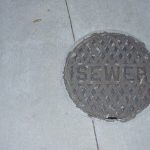Every plumbing pipe and fixture is subject to stresses, and the effects of wear and tear will eventually cause parts to fail. This includes the main water line that supplies water to your home. This line is buried underground; it connects your household plumbing system to the municipal water supply. It’s important to know as much about this water line as you can, and then you can be prepared when it eventually goes bad.
The Importance of the Main Water Line
We rely on water in our homes for drinking, flushing the toilet and washing our dishes. Without a regular supply of clean water, every plumbing fixture and water using appliance in our homes is rendered useless. You may not know much about the material that your main water line is made from or how old it is, but you depend on it to work every day.
If the Main Water Line Stops Working
If the main water line becomes damaged or collapses and it’s beyond repair, there will be no water for the home until the damage is repaired or the line is replaced. This process can take several days, and it will result in a great deal of disruption. A typical water line could last for as long as 70 years, but there is a number of outside factors that can shorten its useful lifespan.
Be Prepared and Inspect the Line
Considering how expensive and disruptive it would be to replace a main water line, it’s a great idea to get it inspected regularly. The best way to do this is to contact a certified plumber and schedule a camera inspection every two years. This will give you plenty of lead time if a problem is discovered to explore your options on how to proceed. The main threats to your water line evolve slowly, so a comprehensive camera inspection will put you back in charge of how to respond to these threats.
What are the Main Threats?
Many homeowners assume that their main water line is well protected because it’s buried underground. But, there are internal and external threats that can still damage the line.
The internal threats are inside the line itself. Corrosion or rust could form inside any metal pipe forming cracks and then breaks in the line. Another internal threat is caused by sediment that can buildup in the line, narrowing the pipe and reducing the water pressure.
The external threats are outside forces that can act on the line to damage it. The most common is a tree root that will creep towards the line over many years and then breach it to cause a leak and eventually a collapse. Another external threat is digging in your yard; the shovel could hit the line and cause a break.
What Can You Do?
Once a camera inspection is carried out, your
plumber will offer advice on how to proceed. If your main water line is older, it could be made from iron or even worse lead, and they will recommend a replacement with a PVC or copper line. If there is a breach, it may be repairable if you act quickly and the line is in good condition. But, if you need to dig up the yard anyway, many plumbers will simply recommend a replacement to make the best use of the unavoidable disruption.
By Giovanni Longo President Flood Brothers Plumbing
Giovanni Longo is a 3rd generation master plumber who has been practicing his craft and trade in the greater Los Angeles area for well over a decade and a half. A plumbing and hydraulics-engineering innovator, Giovanni’s particular world-class expertise focuses on dealing with challenging sewer system designs as well as resolving complex commercial and residential draining issues. As a certified Flood Mitigation expert, he is also well versed in a wide variety of water damage and remediation solu





